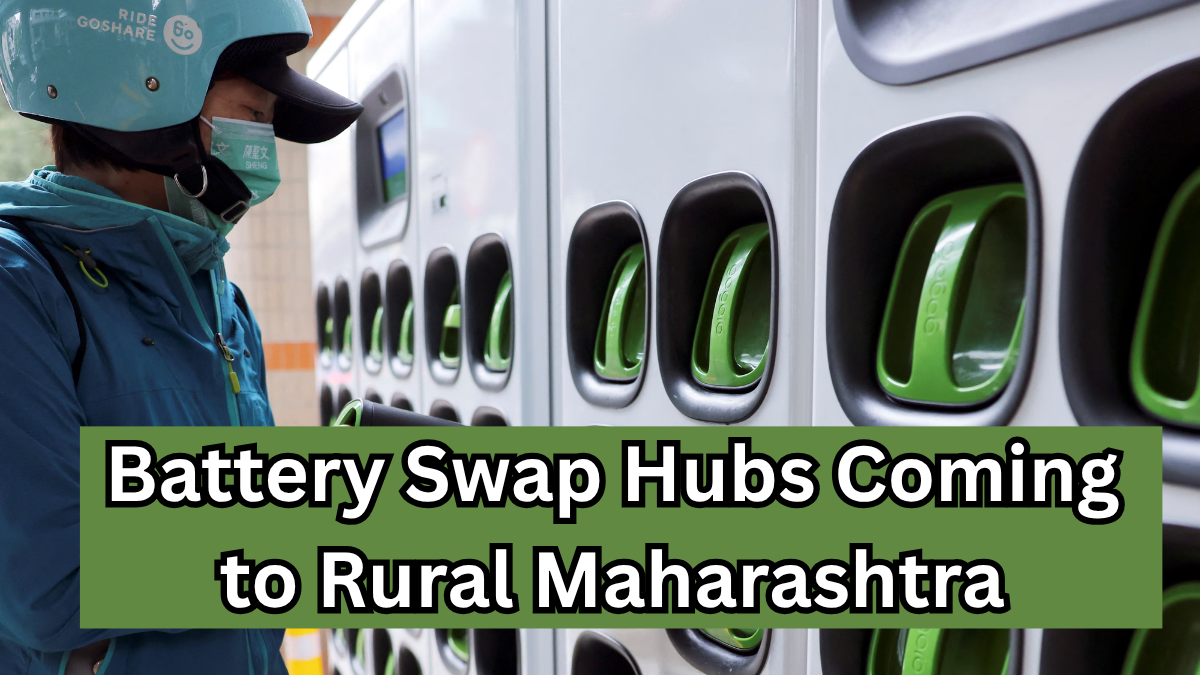The Maharashtra government is taking a significant step toward sustainable transport by introducing Battery Swap Stations in rural areas. This development is set to transform village mobility by making electric vehicle (EV) usage faster, more affordable, and more practical for people living in villages.

What is the Battery Swap Hub Project?
The project focuses on setting up Battery Swap Stations in villages to allow rural residents to exchange depleted batteries for fully charged ones quickly.
Key Objectives
-
Promote village mobility by increasing EV accessibility.
-
Reduce the time spent charging EVs.
-
Eliminate the need for large, expensive charging setups in remote areas.
Why Battery Swap Stations Matter for Villages
Benefits for Rural Maharashtra
-
Quick Battery Swapping: Batteries can be swapped in just a few minutes.
-
Cost-Effective Option: Reduces the cost burden for EV owners by offering battery rentals.
-
Boosts Village Mobility: Supports smoother daily transportation for villagers.
-
Eco-Friendly: Encourages the shift to green, sustainable transport.
Pilot Phase – Where It’s Starting
The pilot phase will begin in select districts with the goal of improving village mobility.
| Districts Covered | Key Features |
|---|---|
| Nashik | Easy access to swap hubs |
| Ahmednagar | Connection to local transport systems |
| Satara | Affordable battery rental services |
The outcome of this pilot will guide the future expansion of Battery Swap Stations across the state.
How Battery Swap Stations Will Work
Simple 3-Step Process
-
Visit a Battery Swap Hub located in key village areas.
-
Drop the Empty Battery with the assistance of trained staff.
-
Collect a Fully Charged Battery and continue your journey instantly.
Boosting Village Mobility Through EV Support
The primary aim is to:
-
Encourage EV adoption in farming and rural communities.
-
Improve transportation between nearby villages.
-
Support e-rickshaw drivers and small delivery vehicles with reliable battery swap services.
Government’s Vision for Rural Maharashtra
The Maharashtra government is planning to:
-
Expand Battery Swap Stations beyond the pilot areas.
-
Offer financial incentives to promote EVs in villages.
-
Partner with EV companies to maintain battery standards and compatibility.
Potential Challenges Ahead
| Challenge | Proposed Solution |
|---|---|
| Low awareness about EVs | Launch educational programs |
| High initial investment | Provide government subsidies |
| Lack of local support | Train village mechanics |
FAQs
Q1: What are Battery Swap Stations?
A: Battery Swap Stations are hubs where EV owners can quickly exchange used batteries for fully charged ones, reducing wait times compared to traditional charging.
Q2: How will Battery Swap Stations improve village mobility?
A: By making battery replacement quick and convenient, Battery Swap Stations will help make EVs a reliable transportation option in rural areas, enhancing village mobility.
Q3: Are Battery Swap Stations expensive for villagers?
A: No, they are designed to be affordable. Villagers can rent batteries instead of purchasing them outright, reducing the financial barrier to EV ownership.
Q4: When will the Battery Swap Stations be available across Maharashtra?
A: The pilot phase is starting soon in selected districts. Based on its success, the state government plans to expand Battery Swap Stations across rural Maharashtra in the coming years.
Click here to learn more
Pari is a passionate writer known for captivating stories that blend imagination and reality. Inspired by travel, history, and everyday moments, Pari crafts narratives that resonate deeply with readers.